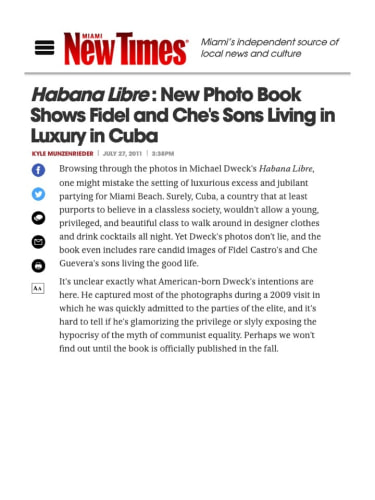Habana Libre: New Photo Book Shows Fidel and Che's Sons Living in Luxury in Cuba
Miami New Times
07/27/2011
Back
By Kyle Munzenrieder
Browsing through the photos in Michael Dweck's Habana Libre, one might mistake the setting of luxurious excess and jubilant partying for Miami Beach. Surely, Cuba, a country that at least purports to believe in a classless society, wouldn't allow a young, privileged, and beautiful class to walk around in designer clothes and drink cocktails all night. Yet Dweck's photos don't lie, and the book even includes rare candid images of Fidel Castro's and Che Guevera's sons living the good life.
It's unclear exactly what American-born Dweck's intentions are here. He captured most of the photographs during a 2009 visit in which he was quickly admitted to the parties of the elite, and it's hard to tell if he's glamorizing the privilege or slyly exposing the hypocrisy of the myth of communist equality. Perhaps we won't find out until the book is officially published in the fall.
The description provided by the book's publisher, Damiani, hints at both:
Behind the clichéd press images of vintage cars, crumbling buildings, peeling paint and a struggling unhappy people held back from progress, lays a hidden society of Cubaʼs most influential people -- the creative class. It is a socially connected group of keenly observant artists, glamorous models, filmmakers, musicians and writers captured in an elaborate dance of survival and success. Their lives are a constant play of appearances; they are the privileged class in a classless society.
These Cubans are international, elegant, and sophisticated. They have cars and passports in a country where travel is difficult if not impossible. They are fashionable, though Cuban couture is an oxymoron as there are few stores. They are socialists who would be lost without capitalism to sell their creative wares in the worldʼs markets. And they are the pride and flesh of Cubaʼs culture. They put their conscience on record, their art is their vision of the country.
The New York Times depicts the cast of characters inhabiting the photos as "tropical Zoolanders and privileged 'It' girls." Nearly naked women are shown provocatively lounging in lacy lingerie.
However, perhaps more controversial than the scantily clad women is the inclusion of photographs of Alejandro Castro Soto del Valle and Camilo Guevara, the sons of Fidel Castro and Che Guevara, who are big movers and shakers on the social scene.
Through a tricky lens, Guevara is depicted looking pensive during a get-together, and Castro is seen with a pretty young woman while smoking a cigarette.
Though Dweck doesn't comment much about the political implications, he believes inevitably that all of Cuba will look more like this in the coming years.
"This will be the next generation," Dweck tells the Times. "When Cuba opens up, in a year or two.